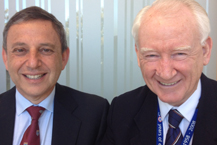
Dr Mark Nidorf and Prof Peter Thompson
A team based at Sir Charles Gairdner Hospital in Perth has won a prestigious National Health and Medical Research Council award (NHMRC) in recognition of its work to improve treatments for heart and kidney disease.
At the awards ceremony last night in Canberra the Federal Minister for Health, Sussan Ley, presented the Marshall and Warren Award to Professor Peter Thompson, the Deputy Director of the Harry Perkins Institute of Medical Research, for his innovative use of a $2.3 million grant that is being used for a study on patients with stable coronary heart disease.
Prof Thompson was picked out of about 3000 other possible winners, in all fields of research in Australia.
Named after Barry Marshall and Robyn Warren for their innovative work leading to the Nobel Prize in 2005, the award is a huge achievement for Prof Thompson and his team.
He said he was delighted to have won.
“Earlier in the year we received a grant of $2.3 million from the NHMRC for clinical trial to test about 5000 patients. The trial is well underway, overseen by Dr Mark Nidorf, previously a cardiologist at SCGH, Prof John Eikelboom, a Perth-trained medical graduate who now is based in Canada, and Charley Budgeon, a statistician at SCGH.
“We are studying why some cholesterol plaques in the coronary artery become inflamed and cause coronary thrombosis (heart attacks).
“We have discovered a new use for colchicine, a drug widely used for gout, which is quite inexpensive and relatively free of side effects. It can reduce heart attacks in patients already fully treated for their heart disease.”
Professor Peter Leedman, the Director of the Harry Perkins Research Institute, said he was delighted the team had been recognised for their innovative research that had the potential to transform treatments for serious conditions.
Minister Ley, who presented 21 awards, said she was proud of Australia’s standing on the international research stage and that these awards recognised some of the leading Australian researchers.
“Australia is a world leader in health and medical research and these researchers will no doubt continue to make a strong contribution to improving the health of all Australians,” Ms Ley said.
“I congratulate the award winners and look forward to continuing to work closely with the research community to come up with the treatments of tomorrow, today.”